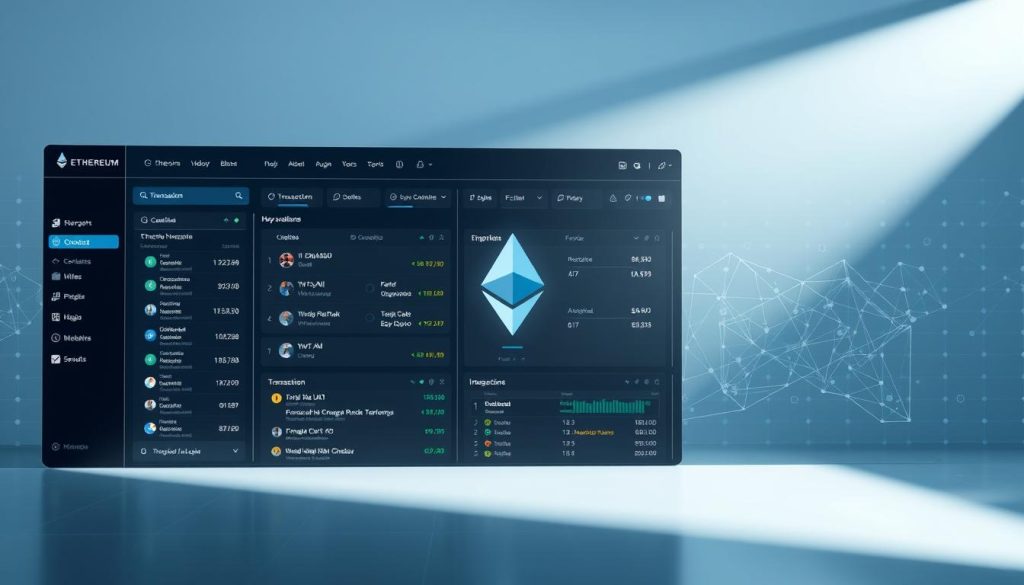A staggering $9 trillion in retirement funds might soon enter digital assets. This is due to recent regulatory changes. It’s more money than the entire cryptocurrency market has ever seen.
The current market patterns feel fundamentally different. Bitcoin recently surpassed $120,000. Ethereum also reclaimed the $3,400 mark. These events have shifted market dynamics significantly.
XRP’s rally to its new all-time high above $3.5 is noteworthy. It signals unprecedented institutional money flow. This isn’t a typical retail-driven frenzy.
Trump’s executive order could open retirement markets to crypto investments. This has created a perfect storm. The regulatory landscape is becoming clearer.
The cryptocurrency market is responding with explosive growth. Multiple digital assets are showing impressive performance.
Key Takeaways
- Bitcoin breakthrough above $120,000 signals strong institutional adoption
- Ethereum’s recovery past $3,400 confirms renewed investor confidence
- XRP’s new all-time high above $3.5 demonstrates broad market strength
- Trump’s executive order could unlock $9 trillion in retirement funds for crypto
- Current market cycle shows institutional rather than retail-driven growth
- Regulatory clarity is creating favorable conditions for digital asset expansion
What is Altcoin Season?
Altcoin season is a hot topic in crypto circles. It’s when alternative cryptocurrencies outperform Bitcoin over time. This shift in market dynamics follows predictable patterns.
An altcoin rally happens when other cryptocurrencies beat Bitcoin’s performance. It’s not random price movement. Instead, it’s a measurable change in how the market behaves.
Definition and Significance
Altcoin season shows a change in how investors think and spend. Bitcoin’s market share usually drops below 40% as money moves to other projects.
This matters for crypto investing because of the big returns possible. Bitcoin might gain 30%, but good altcoins often see gains of 100-500% or more.
The current cycle is different from before. Institutional involvement is changing everything. Pension funds, corporations, and financial institutions are now entering the market.
“This institutional backing could mean more sustained growth rather than the boom-bust cycles we’ve seen before.”
To make the most of these chances, investors should know the top altcoins to buy in 2025. This knowledge helps with smart portfolio choices.
Historical Context
Past altcoin seasons show interesting patterns. The typical cycle has three main phases. These phases help us understand how the market moves.
| Phase | Duration | Characteristics | Bitcoin Dominance |
|---|---|---|---|
| Initial Rally | 2-4 weeks | Bitcoin leads, large-cap alts follow | 55-60% |
| Peak Season | 2-3 months | Mid and small-cap alts explode | 35-45% |
| Rotation Back | 1-2 months | Profits flow back to Bitcoin | 50-55% |
In the past, these seasons lasted 3-6 months total. The 2017 season saw some altcoins gain over 1000% quickly. The 2021 cycle lasted longer, almost eight months.
The current market is different because of institutional investors. Traditional finance entering crypto might lead to more stable growth patterns. This could change how altcoin seasons work.
Institutional money moves differently than retail money. It’s more patient and strategic. This could change how altcoin seasons play out in the future.
Signs That Altcoin Season Has Arrived
The signs of altcoin season are everywhere. Key indicators I’ve been tracking are all flashing green simultaneously. Bitcoin’s dominance is starting to crack, signaling potential altcoin surges.
This shift creates opportunities for savvy traders. Understanding crypto trading strategies and market mood is crucial. Traders who can read these signs may find profitable openings.
Market Trends and Indicators
Institutional money tells the real story. Bitcoin spot ETFs have seen massive inflows correlating with price movements. However, flow patterns are changing.
Ethereum spot ETFs have had nine weeks of net inflows. The total inflows amount to $13.4 billion. This shows institutional confidence in altcoin fundamentals.
Technical indicators support this narrative. When analyzing data for altcoin market analysis, clear patterns emerge:
| Indicator | Current Status | Significance | Trend Direction |
|---|---|---|---|
| Bitcoin Dominance | Declining | Capital flowing to altcoins | Bearish for BTC dominance |
| ETF Inflows | $13.4B (ETH) | Institutional adoption | Strongly bullish |
| Trading Volume | Increasing | Market participation rising | Bullish |
| Altcoin/BTC Ratios | Strengthening | Outperforming Bitcoin | Bullish for alts |
These numbers represent a fundamental shift in institutional views. Recent regulatory clarity has opened previously locked doors. This change signals a new era for crypto investments.
Social Media Sentiment
Crypto conversations have evolved dramatically. Discussions now focus on fundamentals and regulatory developments. This maturation signals a healthier market environment.
Social media analysis shows a shift towards technical analysis and project fundamentals. Traders are discussing utility, partnerships, and real-world adoption. Price speculation is no longer the main focus.
Crypto-friendly legislation has created genuine optimism. The GENIUS Act and Clarity Act are boosting market confidence. These regulatory wins, combined with technical indicators, paint a clear picture.
This isn’t just another pump cycle. Infrastructure, institutional support, and regulations are aligning for sustainable growth. Smart crypto trading strategies now focus on projects with strong fundamentals.
Top Altcoins to Watch in 2023
Three altcoins stand out in the current bullish altcoin trends. These projects offer compelling altcoin investment opportunities based on market analysis and real-world utility. Each pick stems from careful observation of market dynamics and corporate adoption.
Ethereum Overview
Ethereum has evolved into more than just a technology platform. It’s now both a store of value and a technological platform. This unique positioning makes it attractive for institutional portfolios.
ETH recently hit $3,400, with institutions solidifying its narrative. Companies like SharpLink Gaming now hold about 3% of the total ETH supply. Ethereum bridges two worlds: digital gold for finance and infrastructure for tech companies.
Cardano Potential
Cardano is making waves with renewed development activity and strategic partnerships. Its academic approach is now paying off, with solid foundations built over time. Recent ecosystem developments suggest untapped market potential.
Corporate balance sheets are diversifying beyond Bitcoin and Ethereum. BNB, SOL, TRX, and HYPE are appearing in company holdings. This signals broader acceptance of altcoins by institutions.
Solana Growth Prospects
Solana offers immediate opportunity due to its weak recovery. It’s shown the weakest recovery in this cycle, indicating more upside potential for institutional investment. SOL’s price can move quickly when conditions align.
Solana’s ecosystem thrives with meme trading and serious DeFi applications. Multiple catalysts are lining up, including an approved spot staking ETF. Pending traditional spot ETF applications create perfect conditions for institutional adoption.
We’re not seeking the “next Bitcoin.” Instead, we’re identifying projects that will benefit from institutional adoption and technological growth. These altcoins show promise in the evolving crypto landscape.
Analyzing Market Data and Statistics
Current market statistics reveal hidden patterns suggesting untapped potential. The numbers tell a story most investors overlook. The real opportunity lies in understanding the market’s underlying dynamics.
A “compressed spring” effect exists between Bitcoin and altcoin performance. Most altcoins show recovery rates below 50% from previous peaks. Some haven’t even reached 30% of their former value.
This data is crucial for crypto portfolio diversification strategies. The market’s uneven movement creates distinct opportunities for savvy investors.
Price Trends of Top Altcoins
Major altcoins remain significantly undervalued compared to their historical performance. This creates unique entry points for strategic investors. XRP’s recent surge to $3.50+ shows what happens when regulatory clarity meets institutional interest.
This movement validates the compressed spring theory. When the right catalysts align, suppressed prices can skyrocket rapidly.
Altcoin price predictions become more reliable when analyzing recovery percentages. Coins with 30-50% recovery rates have potential for 100-200% additional growth.
Market Capitalization Overview
Market cap distribution shows extreme concentration in Bitcoin. However, institutional accumulation tells a different story. Listed companies now hold 673,000 Bitcoin, 3.2% of the total supply.
These same institutions control 9.6% of all Ethereum. This creates artificial scarcity while building price floors. Traditional finance players are entering the space systematically.
The market cap analysis indicates we’re still in early institutional adoption phases. This means significant growth potential as more traditional players enter. The numbers support a bullish outlook for strategic altcoin positions.
| Metric | Bitcoin | Ethereum | Major Altcoins |
|---|---|---|---|
| Price Recovery Rate | New ATH | ~65% | 30-50% |
| Institutional Holdings | 3.2% of supply | 9.6% of supply | Growing rapidly |
| Market Cap Concentration | Dominant | Secondary | Fragmented |
| Growth Potential | Moderate | High | Very High |
These statistics support a strategic approach to altcoin investments. The data shows clear advantages for positioning in quality altcoins now. Institutional money flow validates the long-term thesis while current prices offer attractive entry points.
Predictions for the Coming Months
The cryptocurrency market is evolving. Institutional maturity is becoming evident. This shift suggests a new era for altcoin performance.
DEX derivatives trading reached $799.1 billion in quarterly volume. This record indicates significant institutional involvement. Hyperliquid’s rise to the 8th largest trading platform showcases rapid infrastructure development.
Expert Opinions
Experts agree on key themes. Regulatory clarity will accelerate adoption, according to institutional analysts. They’re focusing on sustainable growth rather than dramatic price spikes.
Institutional flows are creating stable price floors. This changes the dynamics of the next altcoin rally. We may see measured growth instead of extreme volatility.
Real utility will determine success. The RWA sector is gaining policy support. Government backing for blockchain adoption is now a reality.
Price Targets and Projections
Major altcoins could see 2-5x gains in the next six months. Some might reach 10x, but that’s not the primary focus.
Sustainability is key this time. Sophisticated trading strategies are emerging in the derivatives market. This indicates a shift from speculation to market-making and hedging.
Here’s what to watch in the coming months:
- Ethereum maintaining above $2,000 with potential moves to $4,000
- Cardano showing steady growth toward $1.50-$2.00 range
- Solana potentially reaching $200-$300 if ecosystem development continues
The cryptocurrency market is maturing rapidly. Institutional money seeks consistent, risk-adjusted profits. This trend is evident in the current market structure.
Data suggests more predictable growth patterns ahead. While not financial advice, opportunities remain as the market evolves.
Tools for Tracking Altcoin Performance
I’ve built a toolkit to stay ahead of altcoin trends. It combines analytical platforms and portfolio management tools. These tools help catch rallies early and avoid missing out.
Effective crypto trading starts with real-time market data. Better information can change everything in trades. I’ve learned this through experience.
Analytical Websites and Platforms
Coinglass is my go-to for derivatives data and market sentiment. It recently showed XRP futures Open Interest topping $10 billion. The funding rate data turned positive weeks before the price surge.
On-chain analytics are often overlooked. Glassnode and Santiment provide crucial institutional flow data. These insights help time entries and exits better than basic price charts.
LunarCrush and the Fear & Greed Index track social sentiment. Combining technical analysis with sentiment data gives a fuller market picture.
The key is not relying on any single tool but building a comprehensive view of the market from multiple data sources.
Portfolio Management Tools
CoinTracker handles tax reporting and performance tracking. It syncs with exchanges and wallets automatically. For DeFi, I use DeFiPulse to monitor protocol health and TVL flows.
Traditional finance indicators matter too. I track bond yields, dollar strength, and equity flows on TradingView. These factors influence institutional money moves.
| Tool Category | Primary Platform | Key Features | Best For |
|---|---|---|---|
| Derivatives Data | Coinglass | Open Interest, Funding Rates | Market Sentiment Analysis |
| On-Chain Analytics | Glassnode | Institutional Flows, Network Health | Long-term Trend Analysis |
| Portfolio Tracking | CoinTracker | Tax Reporting, Performance Metrics | Investment Management |
| Social Sentiment | LunarCrush | Social Volume, Sentiment Scores | Short-term Trading Signals |
Successful crypto trading strategies use multiple data sources. Technical analysis guides entry and exit points. Fundamental research helps understand the bigger picture driving prices.
Risk Factors in Altcoin Investments
Crypto investing comes with serious risks that can wipe out portfolios overnight. Many investors get caught off guard by these challenges. Understanding these risks is crucial for making informed decisions and protecting your capital.
The crypto market rewards preparation and punishes carelessness. Being aware of the risks helps you navigate this volatile landscape more safely.
Market Volatility
Altcoin market volatility can be extreme. The recent XRP rally shows this double-edged sword. Prices surged, but $66 million got liquidated from leveraged markets during the rally.
Short traders were hit hardest. This shows how quickly fortunes can change in crypto. Massive opportunities can also destroy leveraged positions instantly.
Liquidity risk adds complexity. Many altcoins have thin order books. Large trades can move prices dramatically. Never invest more than you can afford to lose.
The psychological factor is huge. FOMO drives terrible decisions. FUD causes panic selling at the worst times.
Regulatory Challenges
Regulatory challenges remain significant despite recent progress. The GENIUS Act and Clarity Act are major steps forward for crypto investing. However, enforcement can still be unpredictable.
XRP’s SEC lawsuit shows how regulatory uncertainty can devastate prices. Sudden policy changes can impact altcoin investments overnight. Different countries have varying approaches to crypto regulation.
This creates complexity for global investors. Smart risk management means staying informed about regulatory developments. Always be prepared for potential changes.
| Risk Type | Impact Level | Mitigation Strategy | Time Frame |
|---|---|---|---|
| Market Volatility | High | Position sizing, stop-losses | Daily |
| Regulatory Changes | Medium-High | Diversification, compliance monitoring | Monthly-Yearly |
| Liquidity Risk | Medium | Avoid thin markets, gradual entry/exit | Hourly-Daily |
| Psychological Factors | High | Predetermined strategy, emotional discipline | Constant |
Always maintain stop-losses and have an exit strategy before entering any trade. Diversify across different altcoins and traditional assets to manage portfolio risk. Never put all your eggs in one basket.
Strategies to Maximize Returns
Successful altcoin investing blends strategy with patience. The crypto market favors those who think beyond simple buy-and-hold tactics. Effective crypto portfolio diversification means understanding market narratives and positioning across growth sectors.
My approach has shifted from chasing quick gains to building lasting wealth. Altcoin seasons follow predictable patterns. Smart investors position themselves before the crowd catches on.
Diversification Approaches
True diversification involves exposure to different narratives and use cases. I’ve organized my portfolio around three core categories. These capture various market opportunities.
Asset reserve tokens form my foundation. Companies are adding BNB, SOL, TRX, and HYPE to their balance sheets. This creates steady demand regardless of retail sentiment.
ETF candidates represent my growth layer. XRP, LTC, and HBAR have clear regulatory paths and institutional interest. They’ll likely benefit when crypto ETFs expand beyond Bitcoin and Ethereum.
My allocation follows a 40-40-20 split. Large-cap projects get 40% for stability. Mid-cap growth stories receive 40% for upside potential. The remaining 20% goes to high-risk plays.
DeFi protocols with real cash flow deserve attention. Projects generating revenue through fees often outperform during bullish altcoin trends. Look for growing total value locked and sustainable tokenomics.
Timing the Market
Market timing is tricky, but patterns exist. Institutional money flows during market hours, while retail dominates evenings and weekends. This knowledge helps optimize entry and exit points.
Dollar-cost averaging is my core strategy. I keep 20% as “dry powder” for opportunities. The best deals appear when fear grips the market. Patience pays more than panic buying.
Bitcoin dominance is my primary timing indicator. Altcoin season begins when Bitcoin’s market share declines consistently. Money flows from Bitcoin to large-cap alts, then mid-caps, and finally small-caps.
The progression is predictable. Ethereum and major alts pump first. Mid-cap projects with strong fundamentals follow. When everyone’s talking about huge gains on obscure tokens, it’s profit-taking time.
Social media sentiment offers timing clues. Early-stage bullish altcoin trends start when crypto Twitter turns cautiously optimistic. The top is near when everyone’s posting gain screenshots.
| Portfolio Allocation | Percentage | Risk Level | Expected Returns | Examples |
|---|---|---|---|---|
| Large-Cap Established | 40% | Low-Medium | 2-5x | ETH, BNB, SOL |
| Mid-Cap Growth | 40% | Medium-High | 5-15x | HBAR, XRP, LTC |
| High-Risk Plays | 20% | Very High | 10-100x | DeFi protocols, new sectors |
Risk management is crucial in any strategy. Never invest more than you can afford to lose. Set predetermined exit strategies for both profits and losses.
The crypto market favors preparation over speculation. Combine thoughtful crypto portfolio diversification with strategic timing. This approach helps capture altcoin season potential while managing risk.
Frequently Asked Questions (FAQs)
These questions show you’re thinking like a serious investor. They represent core challenges every successful crypto investor must navigate. I’ve learned more from answering these than from any market analysis.
What is the best time to invest in altcoins?
Right now is a rare convergence moment I’ve been watching for years. Regulatory clarity is improving, institutional adoption is accelerating, and traditional finance integration is expanding.
Trying to time the exact bottom is futile. I focus on positioning for long-term trends during low-attention periods. Most altcoins remain below previous highs despite stronger foundations.
The best time to plant a tree was 20 years ago. The second best time is now.
This wisdom applies perfectly to altcoin investment opportunities. I’ve found success by accumulating quality projects when others are distracted.
The current environment offers something new: institutional validation. When corporations hold these tokens as treasury assets, that’s strategic positioning.
How do I choose the right altcoin?
I use a framework evolved through wins and losses. First, I look for real utility—projects solving actual problems.
Strong development teams matter more than flashy marketing. I research backgrounds, previous projects, and commitment levels. GitHub activity tells me more than Twitter followers.
Institutional interest is a powerful signal. If professional money managers hold these tokens, they’ve done valuable due diligence.
Tokenomics deserve careful attention. I avoid projects with excessive token unlocks or unclear value propositions. The why behind distribution matters as much as the what.
This market cycle differs fundamentally from previous ones. Institutional money cares about compliance, cash flow, and long-term viability. Sustainable value creation drives lasting success.
My approach has shifted toward projects that institutional investors can actually hold. Regulatory clarity is becoming essential for serious capital allocation.
Success Stories from Previous Altcoin Seasons
Altcoin seasons have seen both incredible wins and huge losses. Each altcoin rally taught me about timing, project choice, and market psychology. These cycles reveal what makes lasting success versus temporary hype.
I’ve seen three major altcoin seasons, each with its own traits. Studying these cycles can guide today’s investments in the cryptocurrency market.
Case Studies
The 2017 altcoin season was pure retail mania. ICO projects raised millions on just whitepapers and promises. Ethereum climbed from $8 to over $1,400 during this time.
Most projects from that era vanished. Ninety-five percent of the tokens I tracked from 2017 are now worthless. The lesson: hype without substance doesn’t last.
The 2020-2021 cycle was different. DeFi and NFTs brought real utility. I gained from projects like Uniswap and Chainlink because they solved actual problems.
Getting in early on ecosystem plays was crucial. Projects benefiting from DeFi growth gave the best returns. Chainlink’s oracle services became vital, driving sustained price growth.
The current cycle shows how institutional money changes everything. We’re seeing sustained accumulation in compliant projects. The cryptocurrency market has matured significantly.
XRP is a perfect example. Years of legal issues kept investors away. Those who held on are now seeing 300%+ gains as adoption grows.
Key Lessons Learned
Surviving regulatory challenges often leads to big rewards. Compliant projects attract institutional interest. This creates staying power that speculative plays lack.
Each altcoin rally shows market evolution. 2017 was about speculation. 2020-2021 focused on utility. Today’s market rewards regulatory clarity and institutional adoption.
Timing matters, but project basics matter more. I focus on teams that build during bear markets. These projects emerge stronger when the next altcoin season arrives.
Diversifying across different project types reduces risk. Infrastructure, utility tokens, and compliant projects each have their place. Understanding cycle narratives is key.
The most important lesson? Patience pays off in crypto. Projects solving real problems and meeting regulations tend to give the best long-term returns.
Community Insights and Discussions
Crypto communities have evolved dramatically in recent years. They now engage in sophisticated discussions blending technical analysis with institutional perspectives. This shift reflects the market’s maturation and growing complexity.
Modern platforms host comprehensive altcoin market analysis rivaling traditional financial research. The depth and quality of these discussions showcase the crypto space’s rapid development.
Forums and Online Communities
Crypto forums have transformed significantly since their inception. BitcoinTalk now shares space with platforms hosting institutional-grade discussions. The landscape has expanded to include diverse perspectives and analysis.
Reddit’s r/CryptoCurrency has become a hub for fundamental analysis. Posts often explore ETF flows, corporate strategies, and DeFi yield farming mathematics. The quality of discourse has improved remarkably.
Discord servers offer real-time crypto trading strategies discussions. These communities often break news faster than traditional media. Members share on-chain metrics, regulatory updates, and institutional flow data.
Crypto Twitter hosts dynamic discussions on various topics. These range from technical analysis to Bitcoin’s role in corporate treasuries. The shift to detailed research reflects the community’s growing sophistication.
| Platform | Primary Focus | Community Type | Analysis Quality |
|---|---|---|---|
| BitcoinTalk | Technical discussions | Early adopters | Deep technical |
| Reddit r/CryptoCurrency | Fundamental analysis | Retail investors | Mixed quality |
| Discord Servers | Real-time trading | Active traders | High-frequency insights |
| Crypto Twitter | News and analysis | Mixed audience | Variable quality |
Influencer Perspectives
Crypto influencers have evolved from price predictors to analytical voices. Today’s top influencers combine multiple approaches to provide comprehensive market insights. They track institutional flows alongside traditional technical indicators.
Leading voices now offer educational content rather than just price calls. They explain complex concepts like yield farming, institutional adoption, and regulatory implications. This shift reflects the growing sophistication of the crypto community.
Traditional finance professionals joining crypto discussions have elevated the conversation quality. Their involvement signals a new phase in crypto’s development and acceptance.
Influencer perspectives on crypto trading strategies have become more nuanced. Respected voices emphasize risk management, diversification, and long-term thinking. They discuss position sizing, correlation analysis, and portfolio construction.
Top influencers now combine technical and fundamental research. They track developer activity and institutional adoption metrics. This comprehensive approach provides deeper insights into market dynamics.
Social media sentiment analysis has become a valuable market psychology tool. Shifts in tone often precede significant market movements. The community’s collective intelligence helps in timing market entries and exits.
Conclusion: Preparing for Altcoin Opportunities
Cryptocurrency markets are at a turning point. Trump’s potential executive order could open $9 trillion in retirement funds to crypto. This move validates cryptocurrencies on a massive scale.
Strategic Positioning for Market Evolution
Altcoin price predictions favor projects with strong fundamentals and institutional appeal. Current bullish trends are backed by adoption metrics and regulatory clarity.
Investors are eyeing AI protocols, DePIN infrastructure, and tokenized real-world assets. These explosive new coins launching in 2025 typically have market caps between $20M-$500M. They also show active community engagement across platforms.
Statistics support continued growth. Institutional flows are speeding up, and regulatory barriers are falling. Infrastructure is also maturing rapidly.
Success requires discipline over emotion and research over speculation. Quality beats quantity in altcoin investments. Community engagement and technology are key factors.
This altcoin season is unique due to evolved infrastructure. Smart investors approach markets with intelligence, not impulse. Stay informed and think long-term for the best results.









 Bitcoin
Bitcoin  Ethereum
Ethereum  Tether
Tether  XRP
XRP  USDC
USDC  Solana
Solana  TRON
TRON  Lido Staked Ether
Lido Staked Ether  Figure Heloc
Figure Heloc